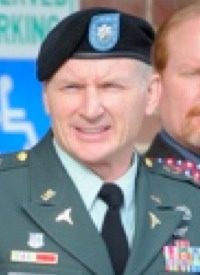
Lt. Col. Terrence Lakin of Greenley, Colorado, underwent three days of court-martial proceedings at Fort Meade in Maryland before hearing his sentence. On the first day of court proceedings, Lakin pled guilty to the charge that includes not meeting with his superior when asked to do so and not reporting to duty at Fort Campbell.
At his trial, Lakin admitted regret over his decision not to report to duty, but added that he had exhausted all other options.
“I was praying and soul searching,” he said. “I believed there was a question that needs to be answered to ensure a valid chain of command. But I had asked every question, done everything else I could short of disobeying orders, without success.”
Lakin pled “not guilty” to the second charge that he missed a flight on which he was required to be, contending that he is not mandated to follow orders under a constitutionally ineligible President.
On day three of his court-martial, however, Lakin was found guilty.
Lakin, who served in the military for 17 years and boasts a pristine record and a number of military awards, declared in March 2010 that he would not engage in another tour of duty in Afghanistan until President Obama proved beyond a reasonable doubt that he was qualified to serve as President of the United States.
Following his announcement, Lakin filed a number of motions seeking the president’s birth and school records, but the motions were rejected. Likewise, Lakin placed President Obama on his witness list in June, but to his disappointment, Obama was not accepted as a witness. Lakin also requested Occidental College records, Hawaii State Dept. of Health records, Harvard University records, Columbia University records, and Punahau school records, and relevant witnesses, all of which were rejected.
Daniel J. Driscoll, the investigating officer, explained the rejection of the materials and witnesses: “The Defense quest to use a military justice forum to invalidate all military authority while undermining the authority of a sitting United States President certainly appears at first blush to be a nonjusticiable political question.”
Once Lakin discovered he would not be permitted to construct his case around questions of President Obama’s eligibility, he knew the outcome was all but certain.
Thomas Kenniff, a former Jag officer, explains:
What sealed Col. Lakin’s fate was the pretrial order from the judge, and what the pretrial order said was this whole issue of the legitimacy of the order or the legitimacy of the president, where he was born and so forth, that’s not a factual issue for the jury. That’s a question of law for the court to decide before we even get to trail. Remember, judges decide issues of law, juries decide issues of fact.
Kenniff adds, “It took the military judge about 15 seconds to rule that whether or not the president is born in Hawaii or is a natural born citizen is not relevant. What is relevant is that he is a duly-elected president of the United States, he was sworn-in in January 2009 as commander-in-chief.”.
All that was left for the jury to decide was whether the order to deploy was lawful, and whether Lakin complied with the orders.
Lakin did have the support of some prominent figures, including Dr. Alan Keyes and retired Major General Paul Vallely, both whom testified on Lakin’s behalf, as well support from the DC-based American Patriot Foundation.
Lakin was not the first military figure who objected to deployment after asserting that Obama lacked proper authority to serve as commander. In September 2009, a U.S. Army Reserve doctor refused to follow deployment orders to go to Afghanistan, alleging that President Obama was an illegal President. Federal Judge Clay Land dismissed the case, however.
Members of the military are not the only ones who question President Obama’s citizenship status. According to an August CNN poll, only 42 percent of Americans are absolutely certain that Obama is a citizen.
CNN reports:
More than a quarter of the public have doubts about Obama’s citizenship, with 11 percent saying Obama was definitely not born in the United States, and another 16 percent saying the president was probably not born in the country. Forty-two percent of those questioned say they have absolutely no doubts that the president was born in the U.S., while 29 percent say he "probably" was.
Senior legal analyst Jeffrey Toobin contends that the “birther controversy” was irrelevant in Lakin’s case, however, as the primary issue is that of military “discipline.” “If every military officer or enlisted person who got an order could question whether the president was really the president, discipline would disappear overnight. You have to have a system of discipline,” Toobin said.
Photo of Lt. Col. Terrence Lakin: AP Images




